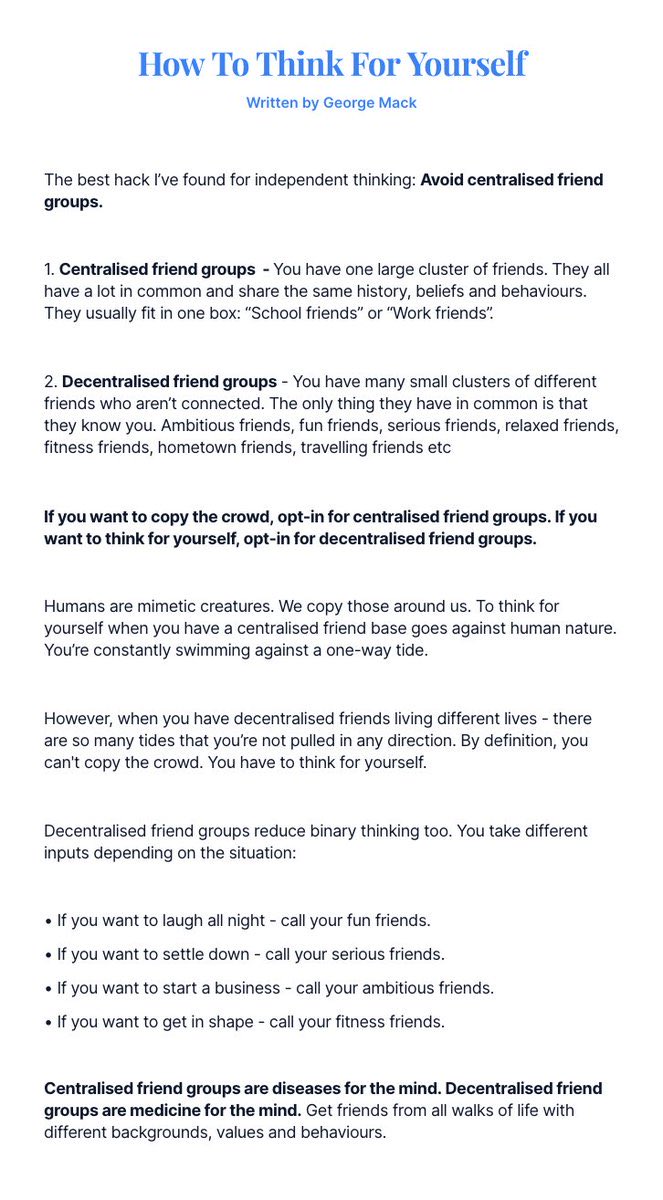The Feynman Technique
To learn anything:
Step 1: Identify a topic.
Step 2: Try to explain it to a 5-year-old.
Step 3: Study to fill in knowledge gaps.
Step 4: Organize, convey, and review.
True genius is the ability to simplify, not complicate.
Simple is beautiful.
Directional Arrow of Progress
"Study the undeniable arrows of progress." -
@wolfejosh The future is extremely difficult to predict—but there are clues.
Look at the trend line of progress and where it's pointing—directionally, not precisely.
Invest (or build) accordingly.
The Eisenhower Decision Matrix
Place all of your tasks on a 2x2 matrix of urgency and importance.
(1) Important & Urgent
(2) Important & Not Urgent
(3) Not Important & Urgent
(4) Not Important & Not Urgent
Prioritize, delegate, or delete accordingly.
The Regret Minimization Framework
The goal is to minimize the number of regrets in life.
When faced with a difficult decision:
(1) Project yourself into the future.
(2) Look back on the decision.
(3) Ask "Will I regret not doing this?"
(4) Take action.
The
@KatColeATL Pygmalion Effect
High expectations lead to high performance (and vice versa).
If you consistently see people as their potential, they will achieve more.
When you're occasionally let down, consider it a tax you pay for all the benefit from those you believed in.
The
@nntaleb "Look the Part" Framework
If forced to choose between two options of seemingly equal merit, choose the one that doesn’t look the part.
The one who doesn’t look the part has had to overcome much more to achieve its status than the one who fit in perfectly.
Decentralized Friend Groups
Centralized Friend Group: one cluster of friends with shared backgrounds and beliefs.
Decentralized Friend Groups: small clusters of friends unconnected to each other.
Opting for decentralized friend groups is the key to independent thought.
The Bragging Framework
Truly successful people rarely feel the need to boast about their success.
If someone regularly boasts about their income, wealth, or success, it’s fair to assume the reality is a fraction of what they claim.
The
@naval Lion Framework
Modern work culture is a remnant of the Industrial Age. It encourages long periods of steady, monotonous work unsuited for the Information Age.
To do truly great, creative work, you have to be a lion.
Sprint when inspired. Rest. Repeat.
The Seinfeld Calendar Framework
Jerry Seinfeld would hang a huge calendar on the wall and use a red marker to put an X over every day that he completed his daily writing.
It wasn't about the writing being good, it was about the consistency.
Applies to more than just writing...
Christensen's Disruptive Innovation Framework
New innovation may take root by providing a simple solution to a segment of a market that is under or over-served by incumbents.
Upstarts provide the exact level of product/service needed and relentlessly drive this wedge to expand.
Skin in the Game
Skin in the Game means that the key principals participate in both the upside and downside associated with any decisions.
Always look for its presence in any new situation.
Avoid games where those making the rules don't have any skin in the game.
7 Powers
Hamilton Helmer's "7 Powers" is a holy grail of business strategy.
The 7 Powers are the foundation of durable value creation:
(1) Cornered Resources
(2) Counter-Positioning
(3) Network Economies
(4) Scale Economies
(5) Switching Costs
(6) Branding
(7) Process Power
Play to Learn
Old Way: Learn to Play.
New Way: Play to Learn.
We are living in an unprecedented era—historical boundaries are being broken, enabling anyone to participate.
If you're trying to learn anything new, insert yourself into the game.
It's the only way.
Porter's Five Forces
A framework for analyzing the competitive intensity of a given market.
The five forces to consider:
(1) Competitive Rivalry
(2) Supplier Power
(3) Customer Power
(4) Threat of Substitution
(5) Threat of New Entry
Thoughtful consideration = better outcomes.
The Weekend Test
"What the smartest people do on the weekend is is what everyone else will do during the week in ten years." -
@cdixon Observe the weekend projects of the smartest people in your circles.
Odds are those will become a key part of our future.
Invest accordingly.
The
@paulg Crazy Idea Framework
If someone proposes a crazy idea, ask:
(1) Are they a domain expert?
(2) Do I know them to be reasonable?
If yes on both (1) and (2), you should take the idea seriously, as it may be an asymmetric bet on the future.
The Duck Test
If it looks like a duck, swims like a duck, and quacks like a duck, it’s probably a duck.
You can determine a lot about a company or person by regularly observing its or their habitual characteristics.
Newton's Flaming Laser Sword
If something cannot be settled by experiment or observation, it is not worth debating.
This will save you from wasting a lot of time on pointless arguments.
"What Will Stay the Same?" Framework
Jeff Bezos famously said that investing in what might change is risky, but investing in what will stay the same is safe.
The future is hard to predict, so looking for constants you can deliver against may provide a cleaner path to success.
Those are 20 frameworks I have found useful for providing clarity in complex situations.
Follow me
@SahilBloom for more threads on business, finance, and decision-making.
I plan to expand on many of these frameworks in individual threads in the future…
I write deep-dives on these topics in my newsletter. I’m biased, but I think you should join 43,000+ others and subscribe today.
https://t.co/qMB8i60ney
And if you are a job seeker, check out my curated job board, where I share unique roles at high-growth companies in technology and finance.
If you’re a company, DM me for details on how you can have your roles featured.
https://t.co/OrTeubzGii


